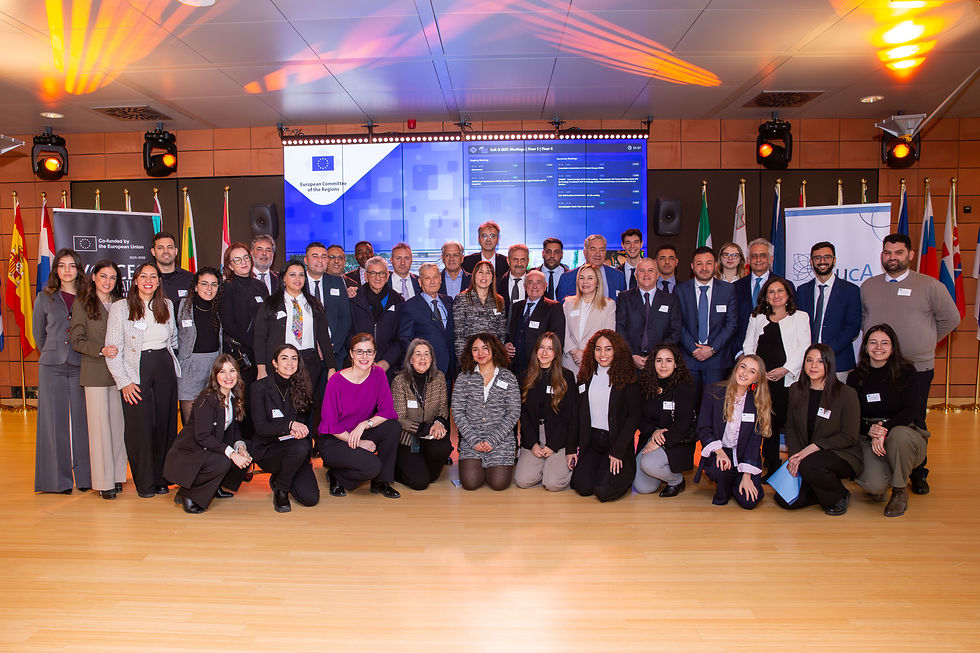VOICES From Migrations | Guido Bognolo's story
- Changemakers
- Jul 2, 2025
- 3 min read
Updated: Aug 12, 2025
“VOICES From Migrations” is a project co-funded by the European Union that gives voice to the untold stories of migrants. Guido Bognolo moved from Italy to Belgium in the 1970s. This is his story.

“My name is Guido Bognolo, and I am originally from Italy. In the 70s, I served as a technical officer in the Air Force and, after completing my military service, I moved to Brussels. Here, I was offered a job opportunity at Procter & Gamble: a very interesting position that fit my idea of what I wanted to do. I finished my service on 15 June 1970, and was in Brussels on July 1st. A few months later, in October, I got married to my wife.
At the time, I planned to stay for just a couple of years, two or three at most, gain some international experience, and then return to my country. But, as they say, nothing is more permanent than a temporary decision. And here I am, still in Brussels after 55 years.
Of course, the idea of returning came up many times, especially at the beginning. But life went on. We had children. I changed jobs. Took on new responsibilities… And in the end, we just stayed.
Even after our retirement, we considered returning to Italy. We looked at different places, we thought about it seriously. But in the end, we understood: our children are here, our grandchildren are here, our doctors are here. Here are our habits, our community, our life. Starting over at seventy? No. We decided to stay.
As for who I am, I think I am still the same person, deep down. But living abroad has changed the way I see the world. I have become more open, more tolerant, and much more curious.
When you live outside your home country, you are forced to question yourself, to understand that not everything is as you were taught. You learn to listen, to observe, to compare. And that, that has really changed me.”
Interview by: Boglár Kiss, Melanie Azetmüller, Sara Russo, and Ula Jankauskaite
Original story in Italian: “Mi chiamo Guido Bognolo e vengo originariamente dall’Italia. Ho prestato servizio come ufficiale tecnico nell’aeronautica e, dopo aver terminato il servizio militare, mi sono trasferito a Bruxelles. Mi era stata offerta un’opportunità di lavoro alla Procter & Gamble — una posizione molto interessante che corrispondeva all’idea che avevo di ciò che volevo fare. Ho concluso il servizio il 15 giugno 1970 e già il 1° luglio ero qui a Bruxelles. Pochi mesi dopo, il 1° ottobre, mi sono sposato con mia moglie.
All’epoca, il mio piano era di restare solo per un paio d’anni — due o tre al massimo — acquisire un po’ di esperienza internazionale e poi tornare in Italia. Ma, come si suol dire, nulla è più permanente di una decisione temporanea. Ed eccomi qui, ancora a Bruxelles dopo 55 anni.
Ovviamente, l’idea di tornare è venuta fuori molte volte, soprattutto all’inizio. Ma la vita è andata avanti. Abbiamo avuto dei figli, ho cambiato lavoro, assunto nuove responsabilità… e alla fine siamo semplicemente rimasti.
Anche dopo il pensionamento, abbiamo preso in considerazione il ritorno in Italia. Abbiamo guardato diversi posti, ci abbiamo pensato seriamente. Ma alla fine abbiamo capito: i nostri figli sono qui, i nostri nipoti sono qui, il nostro medico è qui. Qui ci sono le nostre abitudini, la nostra comunità, la nostra vita. Ricominciare da capo a settant’anni? No, abbiamo deciso di restare.
Per quanto riguarda chi sono, penso di essere ancora la stessa persona, nel profondo. Ma vivere all’estero ha cambiato il mio modo di vedere il mondo. Sono diventato più aperto, più tollerante e molto più curioso. Quando vivi fuori dal tuo paese d’origine, sei costretto a metterti in discussione, a capire che non tutto è come ti è stato insegnato. Impari ad ascoltare, ad osservare, a confrontare. E questo — questo mi ha davvero cambiato.”
Intervista di: Boglár Kiss, Melanie Azetmüller, Sara Russo, Ula Jankauskaite
Read the article in My House of European History:

Funded by the European Union. Views and opinions expressed are however those of the author(s) only and do not necessarily reflect those of the European Union or the European Education and Culture Executive Agency (EACEA). Neither the European Union nor EACEA can be held responsible for them.



Comments